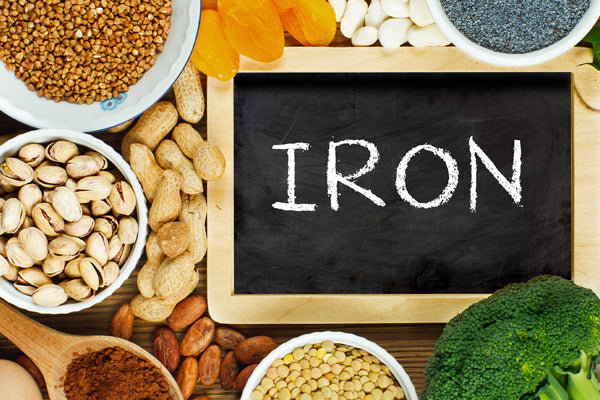
It is well-known that deficiency or overexposure to various elements has noticeable effects on human health. The effect of an element is determined by several characteristics, including absorption, metabolism and degree of interaction with physiological processes. Iron is the most important element for almost all living organisms as it is involved in the process of transporting oxygen, metabolic process and electron transport. Iron can form free radicals, its collectiveness in body tissues must be tightly regulated because when in excessive, it can lead to tissue damage.
Few people who have been diagnosed with iron-deficiency anemia or other few who are conscious about their health, consume an adequate amount of iron in their diets but they still may suffer serious deficiency symptoms. It may come as a surprise to you that absorbing iron is just as important as consuming iron and that there might be some diseases which actually prevent the body from absorbing iron properly. This means that excess of iron that a person takes may not be benefiting the body. In this article, we will explain how the absorption of iron fails.
At times it is seen that in spite of taking Iron rich diet people are deficient to iron. Here are a few certain medical conditions that negatively impact the body’s ability to absorb iron:
Deficiency of Iron vitamin B12 (commonly called folate)
deficiency anemia occurs when a lack of vitamin B12 causes the body to produce abnormally large red blood cells that can’t function properly. You’re more likely to be low in this vitamin if your body can’t absorb enough of it from the foods you eat.
Celiac disease
A lot of people eat a gluten-free diet, it is a must for people with celiac disease. Celiac disease can cause damage to the small intestine where iron, folate and vitamin B12 are absorbed. The most common sign of celiac disease in adults is iron-deficiency anemia that is unresponsive to iron therapy. Iron deficiency anemia is seen more often in people with celiac disease because nutrients are absorbed in the upper two parts of the intestine where damage can occur in earlier stages of celiac disease.
Crohn’s disease
It is a chronic inflammatory disease of the digestive tract. Symptoms include abdominal pain and diarrhea, sometimes bloody and weight loss. In people with inflammatory bowel disease, anemia is the most common complication to occur outside of the digestive tract. About 60% to 80% of people with inflammatory bowel disease are iron deficient. People with IBD may be losing blood through ulcers on the digestive tract lining or they have trouble absorbing iron from foods because of inflammation or surgery. Another cause of low iron is that the diet doesn’t contain enough iron-rich foods.
Hormonal Imbalances
Anemia associated with other conditions usually occurs when there are too few hormones necessary for red blood cell production. Hormones travel through the bloodstream to the tissues and organs, delivering messages that tell the organs what to do and when to do it. Hormones are important for regulating most major bodily processes, so a hormonal imbalance can affect a wide range of bodily functions including iron-deficiency anemia.
Iron Inhibitors like Phytates
Iron, an essential vitamin, is responsible for transporting oxygen throughout the body. Iron absorption is inhibited by plant phytates and tannins. These compounds also chelate iron but prevent its uptake by the absorption machinery. Phytates are prominent in wheat and some other cereals, while tannins are prevalent in (non-herbal) teas. Phytates in food can reduce the amount of iron your body absorbs from iron-rich foods. Even low levels of phytates have a strong inhibitory effect on your body’s ability to absorb iron from foods. Phytates are found in walnuts, almonds, sesame, dried beans, lentils, peas, cereals and whole grains.
Iron is one of the major components of hemoglobin which carries oxygen from the lungs around the body to the cell to produce energy. If iron is not absorbed properly then it will cause anemia. A person will have paleness, weakness, palpitation of heart, fatigue, anorexia, pain in calf muscles, dryness of skin and low mental concentration. If iron is not absorbed properly then an excess amount of iron in the blood causes free radical formation and leads to tissue damage. Iron must be properly absorbed into the body so that it can be stored for both present and future use. Iron is an essential mineral which plays a key role in the making of healthy red blood cells. Without healthy red blood cells, your body doesn’t get enough oxygen. A lack of red blood cells is called iron-deficiency anemia.
Raktda consists of Iron Bhasma in micronized particles which enhances the body to absorb iron naturally from your diet without any side effects. It is also enriched with Vitamin C which enables better iron absorption by the body. Hence, it maintains haemoglobin levels naturally, boosts energy and restores skin & hair health.
Leave a comment (all fields required)
Comments will be approved before showing up.



